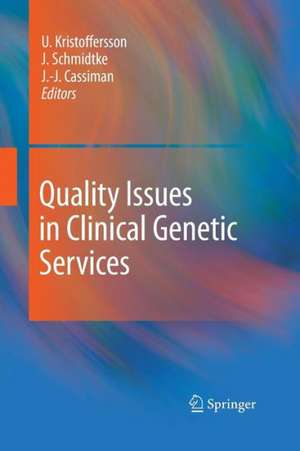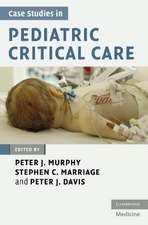Quality Issues in Clinical Genetic Services
Editat de Ulf Kristoffersson, Jörg Schmidtke, J. J. Cassimanen Limba Engleză Paperback – 25 sep 2014
Measuring quality of health care related processes became an issue in the 1990s, mainly in laboratory medicine, but also for hospitals and other health care systems. In many countries national authorities started to implement recommendations, guidelines or legal procedures regulating quality of health care delivery. In laboratory medicine, in parallel, the use of accreditation as a method assuring high quality standards in testing came in use. With the increasing possibilities of performing molecular genetic testing, genetic laboratories needed to become involved in this process.
As many genetic disorders are rare, most laboratories worldwide offered analysis for a specific set of disorders, and, therefore, very early on a transborder flow of samples occurred. While international quality criteria (ISO) have been in existence for a number of years, the regulation of quality issues still may differ between countries.
Based on their personal experience in the varying fields of quality research and clinical implementation of quality criteria in genetic services the authors of thisbook share their experience and give examples of the implementation of quality issues in national quality systems worldwide. This book, which is the result of the effort of many persons, is destined to aid laboratory managers and counsellors, health care managers and other stakeholders in national or international health care service to improve the services to the benefit of patients with suspected genetic disorders.
| Toate formatele și edițiile | Preț | Express |
|---|---|---|
| Paperback (1) | 1416.45 lei 6-8 săpt. | |
| SPRINGER NETHERLANDS – 25 sep 2014 | 1416.45 lei 6-8 săpt. | |
| Hardback (1) | 1423.58 lei 6-8 săpt. | |
| SPRINGER NETHERLANDS – 11 mai 2010 | 1423.58 lei 6-8 săpt. |
Preț: 1416.45 lei
Preț vechi: 1491.00 lei
-5% Nou
Puncte Express: 2125
Preț estimativ în valută:
271.05€ • 289.83$ • 225.99£
271.05€ • 289.83$ • 225.99£
Carte tipărită la comandă
Livrare economică 17 aprilie-01 mai
Preluare comenzi: 021 569.72.76
Specificații
ISBN-13: 9789400791886
ISBN-10: 9400791887
Pagini: 420
Ilustrații: XXV, 393 p.
Dimensiuni: 155 x 235 x 22 mm
Greutate: 0.59 kg
Ediția:2010
Editura: SPRINGER NETHERLANDS
Colecția Springer
Locul publicării:Dordrecht, Netherlands
ISBN-10: 9400791887
Pagini: 420
Ilustrații: XXV, 393 p.
Dimensiuni: 155 x 235 x 22 mm
Greutate: 0.59 kg
Ediția:2010
Editura: SPRINGER NETHERLANDS
Colecția Springer
Locul publicării:Dordrecht, Netherlands
Public țintă
Professional/practitionerCuprins
Improving Quality and Harmonization of Standards in Clinical Genetic Services in Europe: The EuroGentest Network of Excellence.- The CanGèneTest Pan-Canadian Research Consortium on Genetic Laboratory Services.- Regulating Genetic Testing: The Relevance of Appropriate Definitions.- Genetic Diseases as Rare Diseases: A European Policy View.- European Regulatory Issues Related to Quality in Provision of Genetic Service.- The European IVD Directive and Genetic Testing.- Quality Issues in Genetics Services in the United Kingdom.- The Primary Care Perspective of Quality in Clinical Genetics Service – United Kingdom as an Example.- Regulation of Genetic Testing/Service in Canada.- Quality Issues in Clinical Genetic Services in Australia.- Clinical Genetic Testing and Services – The US Perspective.- US Oversight and Regulation of Genetic Testing.- Regulatory Issues in Clinical and Laboratory Genetics in Developing Countries; Examples from Latin America.- Assuring Quality When Establishing Medical Genetic Services in Middle- and Low-Income Nations.- Clinical Validity and Utility of Genetic Testing in Heritable Disorders.- Clinical Validity and Utility of Genetic Testing in Common Multifactorial Diseases.- The Quality of Genetic Screening: An Integral Approach.- The Use of Principles in Allocating Scarce Health Care Resources for Genetic Tests.- Outcome Measures in Clinical Genetics Services.- Direct to Consumer Testing.- Competency Based Core Curriculum for Training Specialists in Clinical Genetics.- Ensuring Education and Quality in the Practice of Health Professionals (Non-medical) Working in Genetic Services.- Quality Issues in Clinical Genetic Services: Ethical Aspects.- Democratic Expert Influence Through Bioethical Advisory Committees? The Case of PGD Legislation inSweden.- Quality Issues in Clinical Genetic Services; Regulatory Issues and International Conventions.- IPR Issues and High Quality Genetic Testing.- Quality Issues in the Evaluation and Regulation of Genetic Testing Services: A Public Health Approach.- Quality Management Systems and Accreditation.- External Quality Assessment in Molecular Genetic Testing.- Quality Issues in Molecular Genetic Testing.- Quality in Cytogenetics.- Fluorescence In Situ Hybridization (FISH) – Quality Issues in Molecular Cytogenetics.- Quality Issues in Biochemical Genetic Testing.- Emerging Technologies, Need for Quality Assessment.- Genetic Counselling in Rare Diseases.- Genetic Counselling for Late-Onset Disorders.- Genetic Counselling for Common Diseases, Cancer Susceptibility as Paradigm.- Genetic Counselling in Disorders of Low Penetrance.- Patient Perspectives on Genetic Testing.
Recenzii
From the reviews:
“Aims to support professionals who wish to implement quality management in order to improve the quality of services … . serve both as a concise reference work and as an informative introduction to the topic … . a comprehensive and valuable compendium of quality issues presented by leading experts in the field. … should be of interest to a wide range of readers: clinical geneticists, genetic counsellors, laboratory geneticists, researchers, healthcare managers, policy advisors of specialist societies, policy makers and other stakeholders around the globe.” (Edward M. Leter, Journal of Community Genetics, Vol. 2, 2011)
“Aims to support professionals who wish to implement quality management in order to improve the quality of services … . serve both as a concise reference work and as an informative introduction to the topic … . a comprehensive and valuable compendium of quality issues presented by leading experts in the field. … should be of interest to a wide range of readers: clinical geneticists, genetic counsellors, laboratory geneticists, researchers, healthcare managers, policy advisors of specialist societies, policy makers and other stakeholders around the globe.” (Edward M. Leter, Journal of Community Genetics, Vol. 2, 2011)
Textul de pe ultima copertă
Initially genetic disorders were all considered as rare diseases. At present, in the mid of 2009, the OMIM catalogue contains information on more than 12 000 entries of which about 2500 are available for clinical testing based on the identification of the responsible gene defect. However, altogether it has been estimated that about 8 percent of a population in the economically developed countries will during their lifetime suffer from a disease mainly as the result of their genetic constitution. Adding to that, it is estimated that all diseases have a genetic component, which will determine who will be at a higher than average risk for a certain disorder. Further it is postulated that in the near future, this genetic profiling could become useful in selecting an appropriate therapy adapted to the genetic constitution of the person. Thus, genetic disorders are not rare.
Measuring quality of health care related processes became an issue in the 1990s, mainly in laboratory medicine, but also for hospitals and other health care systems. In many countries national authorities started to implement recommendations, guidelines or legal procedures regulating quality of health care delivery. In laboratory medicine, in parallel, the use of accreditation as a method assuring high quality standards in testing came in use. With the increasing possibilities of performing molecular genetic testing, genetic laboratories needed to become involved in this process.
As many genetic disorders are rare, most laboratories worldwide offered analysis for a specific set of disorders, and, therefore, very early on a transborder flow of samples occurred. While international quality criteria (ISO) have been in existence for a number of years, the regulation of quality issues still may differ between countries.
Based on their personal experience in the varying fields of quality research and clinical implementation of quality criteria in genetic services the authors of thisbook share their experience and give examples of the implementation of quality issues in national quality systems worldwide. This book, which is the result of the effort of many persons, is destined, to aid laboratory managers and counsellors, health care managers and other stakeholders in national or international health care service to improve the services to the benefit of patients with suspected genetic disorders.
Measuring quality of health care related processes became an issue in the 1990s, mainly in laboratory medicine, but also for hospitals and other health care systems. In many countries national authorities started to implement recommendations, guidelines or legal procedures regulating quality of health care delivery. In laboratory medicine, in parallel, the use of accreditation as a method assuring high quality standards in testing came in use. With the increasing possibilities of performing molecular genetic testing, genetic laboratories needed to become involved in this process.
As many genetic disorders are rare, most laboratories worldwide offered analysis for a specific set of disorders, and, therefore, very early on a transborder flow of samples occurred. While international quality criteria (ISO) have been in existence for a number of years, the regulation of quality issues still may differ between countries.
Based on their personal experience in the varying fields of quality research and clinical implementation of quality criteria in genetic services the authors of thisbook share their experience and give examples of the implementation of quality issues in national quality systems worldwide. This book, which is the result of the effort of many persons, is destined, to aid laboratory managers and counsellors, health care managers and other stakeholders in national or international health care service to improve the services to the benefit of patients with suspected genetic disorders.
Caracteristici
First book on the topic reviewing a whole series of QA issues in clinical/medical genetics There is a need for laboratory managers and administrators to know the basic QA in clinical genetic services There is a need for health care administrators to have some insight in the topic they are to regulate Important for young investigators planning a career in human genetic services





